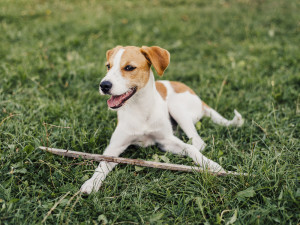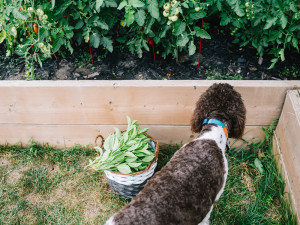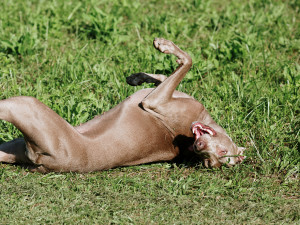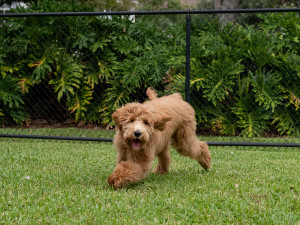Why Do Dogs Eat Grass?
Your pup is literally vegging out—when it’s no big deal and when to worry.
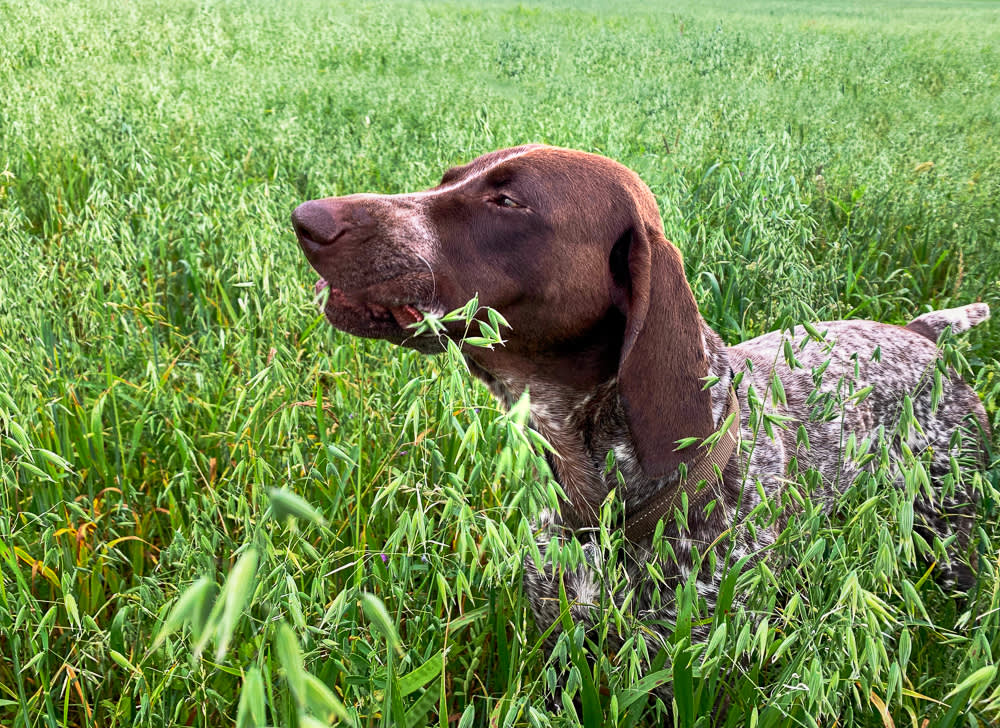
Share Article
In This Article:
Is Eating Grass a Sign of Sickness? Reasons Why Dogs Eat Grass Why Is My Dog Eating Grass and Throwing Up? Should I Let My Dog Eat Grass? How to Keep Your Grass Dog-Friendly How to Stop a Dog From Eating Grass
It’s summer, the sun is shining, and you’re spending more time outside with your dog. Everyone’s happy. There’s just one problem: Your dog’s eating grass. Why? People have many guesses as to why dogs love to chow down on grass, including dietary deficiency, digestive upset, or instinctual behavior.
Most of these ideas are unproven. In most cases, eating grass can be a normal behavior for dogs — so long as it’s occasional. If your dog’s grass eating is persistent or excessive, you might want to take a closer look at your dog’s health. The truth is that no one knows for sure. There have been very few scientific studies designed to answer this question, so most of what we know is based on theories and observations.
One of the main reasons we suspect dogs eat grass is because it is an innate behavior. This is based on observations that wolves, their wild ancestors, also often eat grass. Consuming grass may be a method of obtaining fiber, or grass may remove intestinal parasites as it passes through their digestive tract. Grass may also help create a feeling of fullness when they’re hungry. One early studyopens in new tab showed that dogs tend to eat more grass early in the day and especially before feedings.
Another theory is that dogs eat grass to soothe different kinds of digestive upset, such as vomiting, nausea, or diarrhea. More research is needed to dive into whether any forms of digestive upset lead to an increase in grass eating. No consistent links have been found thus far.

Is eating grass a sign of sickness?
Good news: If your dog’s eating grass, it probably doesn’t mean they’re sick. Based on studies and observations, there’s no consistent link between illness and eating grass. In one study, only eight percent of the respondents reported seeing signs of illness before their dog ate grass, and of that group, only 22 percent reported that their pups actually vomited after doing so.
In another studyopens in new tab, researchers who compared grass-eating behaviors of dogs with mild gastrointestinal disturbances to those without any GI signs found that a healthy dog was actually more likely to eat grass than one with diarrhea. Researchers didn’t compare their findings to other kinds of digestive upset, such as nausea and/or vomiting, so the results could only conclude that diarrhea was not a motivator for dogs to eat grass.
Or, is eating grass normal dog behavior?
For most dogs, eating grass is totally normal. It’s possible that pups eat grass to pass the time or to aid in digestion, or because — here’s a shocker — the grass tastes good. It’s likely that eating grass is a natural behavior for dogs passed down from their wild ancestors. In reality, no one knows for sure why they do it, or if they all do it for the same reason.
Grass may also provide dogs with a source of fiber, which is good for their health. Fiber is technically a form of carbohydrate that is not broken down during digestion. In this manner, it adds bulk to the stool which can help to prevent constipation and increase feelings of fullness without added calories. Some fiber also provides nutrients to the microbiome. Some pups take their grass-eating too far, though, and if they are obsessively eating large amounts of grass it may be worth a deeper investigation.
Reasons why dogs eat grass
There are numerous guesses as to why dogs eat grass. But they’re just that: guesses. The following reasons are unproven but based on specific case studies or observations. It may be that different dogs eat grass for different reasons, so multiple possibilities may be true. Here are some common reasons we think they eat grass:
1. Upset stomach
This has always been a common myth to explain why dogs eat grass. Many people believe that pups eat grass to soothe their stomachs, or as a way to induce vomiting. Studies have not proven this true.
Multiple studies have foundopens in new tab that dogs eating grass do not show any signs of digestive upset, and only a small handful of dogs will vomit after eating grass. More research is needed to draw strong conclusions, but so far, this doesn’t seem to be true for most dogs.
2. Boredom
There are no studies that have focused on this particular theory for grass-eating. However, there are general studies that show some dogs develop behavior issues related to eating non-food items when they are understimulated.
3. Hunger
One early study noted that dogs tend to eat more grass in the beginning of the day and especially prior to feedings. This led to the idea that they may be eating grass to create feelings of fullness.
4. Anxiety
Dogs with certain behavioral disorders including anxiety and compulsive behaviors sometimes eat non-food items. This is known as pica. Eating non-food items can also be caused due to an underlying medical condition, so a suspected case of Pica should be evaluated by a veterinarian.
5. Nutritional deficiency
Some theories have suggested that dogs eat grass as a source of fiber or due to other deficiencies. Nutritional deficiencies can be a cause for pica in general, so a dog who is eating large amounts of non-food items should visit a vet.
Why is my dog eating eating grass and throwing up?
There is not one definitive answer to this question, but there are a lot of different possibilities. First, it is interesting to note that research studies have not shown a link between eating grass and vomiting. The majority of dogs in these studies did not vomit after eating grass, so we don’t think that eating grass routinely causes them to vomit.
We also do not have any scientific proof that dogs who are already feeling sick and have digestive upset will seek out grass more than healthy dogs. Knowing this, it is hard to make a definitive link between eating grass and vomiting. It is possible that some dogs eat grass whether they are sick or not and so it is pure coincidence that sometimes they vomit after eating grass.
If they are mostly eating grass early in the day, especially prior to a meal, they may be vomiting due to a condition known as bilious vomiting syndromeopens in new tab. Dogs with this condition often vomit when their stomach is empty for too long.
The best way to determine why your dog is eating grass is to track their behavior and take note of any patterns. Are they usually snacking on grass around a certain time of day? Do they eat grass when they are alone more often than when you are home? How does it relate to their meal times? These factors can help illuminate what may be motivating them to eat grass and can help your vet give you more answers.
When it comes to why a dog vomits, there are many potential causes. If your dog is vomiting frequently or has other signs of illness such as decreased appetite, weight loss, low energy, and/or diarrhea, have them evaluated by a vet right away. Their vomiting may not be directly tied to eating grass but rather a sign of an underlying illness.
Does grass make dogs throw up?
Not usually, but there are exceptions. We know from research studies that the majority of dogs who eat grass don’t vomit afterwards. However, we have probably all met a dog who ate grass and then threw up. In reality, there are many reasons a dog might puke after eating grass.
One might be pure coincidence — they were going to throw up anyway, and they just happened to also eat grass. Another could be that they ate so much grass that it irritated their esophagus or stomach; sometimes it is not a true vomit but more of a coughing-up of the grass before it even reaches their stomach. Yet another reason could be that there was something on the grass that caused them to vomit, such as fertilizer chemicals or excrement from another animal.
Should I let my dog eat grass?
There’s no straight-forward answer; whether or not to let your dog eat grass depends on a number of factors. How much do they eat? Do they vomit afterwards? Is this grass relatively safe for them? For the average dog who occasionally chews on some grass in the yard and has no adverse reactions, there is no harm in letting them continue.
For dogs who seem to be obsessively eating grass, whether or not they actually get sick, it is important to speak with your vet and make sure there is not an underlying problem that needs to be addressed there. And if you have reason to believe the grass is not safe for them to eat, certainly take steps to prevent them from eating it and keep your pup safe.
How to keep keep your grass dog-friendly
1. Create a dog-safe space.
Don’t use pesticides that contain chemicals that can harm dogs. You may want to make a special dog-safe space in your yard that is free of any plants that may be toxic, too.
2. Clean up poop.
Dispose of dog poop regularly, and consider making a pet-waste digester. You can reduce the risk of parasite transmission by making sure that your dog only eats grass in your own backyard.
3. Keep an eye out for “mean” seeds.
Foxtails — small, dry seeds produced by invasive, grass-type weeds — are prevalent in many lawns and pose a serious danger to dogs. If you have foxtails in your yard, remove them (dig or pull them up, or soak them with vinegar at ground level), and keep a close eye on your dog when they’re in the yard.
In general, it’s a good idea to familiarize yourself with all the plants in your yard so you can also remove or keep your dog away from any plants that may be toxicopens in new tab if ingested.
4. Beware of rough grasses.
One caveat when it comes to grass consumption: long, rigid grasses with sharp edges have been known to cause throat abrasions and can also cause intestinal blockages. The esophagus is sensitive, and in some cases, dogs who eat this type of grass can experience a serious medical issue. If your dog is coughing, not eating, vomiting, or showing signs of irritation after eating these kinds of grasses, contact your veterinarian immediately.
How to stop a dog from eating grass
If you’re worried that your pup is eating a little too much grass, seems to have adverse reactions after eating grass, or that the grass your dog eats isn’t safe, there are ways to prevent your dog from eating grass.
1. Walk your dog on a leash, instead of letting them run free in the yard.
If you are walking with your dogopens in new tab, you can help navigate where they go and stop them right away if they try to chew grass.
2. Use a basket muzzle.
These muzzles are designed for comfort so that your dog can easily pant and even accept treats while wearing it, but they can’t pick up objects and eat them. It is important to train your dog to get used to the muzzle and to make it a positive experience so they are comfortable wearing it.
3. Practice the “Leave it’ cue.
You can work with your dog to learn this cue using positive reinforcement techniques. As your dog becomes more familiar with the cue, it will be easier to stop them in their tracks when they’re eating grass.
4. Provide lots of enrichment and exercise.
For all dogs, but especially those who may be eating grass due to boredom or anxiety, this is key. Be sure your dog’s day is filled with plenty of mental enrichment activities like food puzzles, socialization, training sessions, and lots of exercise so that they don’t resort to undesirable habits to fill their time.
If you feel that your dog’s behaviors are extreme, seek out a veterinary behaviorist who can help. These cases can be very challenging and may require expert insight as well as formal training and even medication for dogs who are suffering from extreme anxiety and behavioral disorders.
FAQs
Why do dogs throw-up?
Vomiting has many possible causes including eating non-food items, infections, parasites, congenital problems, chronic diseases, and more. It is very important to see a vet if your dog is vomiting repeatedly.
Why is my dog coughing?
Coughing also happens for many different reasons, just like in people. Dogs can get infections, develop chronic diseases, and even have anatomical problems that cause coughing. You should always have your dog examined by a vet if they develop a cough.
How do I dog-proof my yard?
Dog-proofing your yard involves multiple steps. Be sure to consider safe ways to enclose the space, planting non-toxic plants, and blocking off other dangers like fire pits, swimming pools, and barbecues.
References:

Daniela Lopez
Daniela Lopez is a digital media specialist and long-time contributor to The Bark.

Dr. Amy Fox, DVM
Amy Fox, DVM is a small animal veterinarian in New York City with over thirteen years of experience in a mixture of general practice, emergency medicine, and shelter medicine. A lifelong animal lover, Dr. Fox studied biology in college and then worked as a veterinary nurse before pursuing veterinary school at Cornell University. Her expertise includes surgery, dentistry, and management of chronic conditions, and she is interested in toxicology, pain management, nutrition, care of senior pets, and educational outreach. Dr. Fox also enjoys writing about veterinary medicine and teaching, and her work has previously appeared in Spruce Pets. In her free time, she loves to cook, garden, go for long runs, and hang out with her goofy mixed-breed dog May, who provides never ending comic relief!
Related articles
![Cute weimaraner dog lying on lawn and scratching its back]()
Best Allergy Medicines That You Can Give to Your Dog
Here’s what works (and what doesn’t).
![Dog sitting on a couch in a living room with plants]()
5 Plants That Are Toxic to Your Dog
Thriving plants are spring’s whole thing—but these offenders can be perilous to pets.
![goldendoodle puppy playing in grass in yard]()
The Dirt on Dog-Proofing Your Yard
10 steps to a safe outdoor space. Landscaper not required.
![Dog near a vegetable garden next to a basket full of a harvest]()
Tips on Dog-Safe Gardening
Garden organically, for the sake of both the planet and your dogs.

